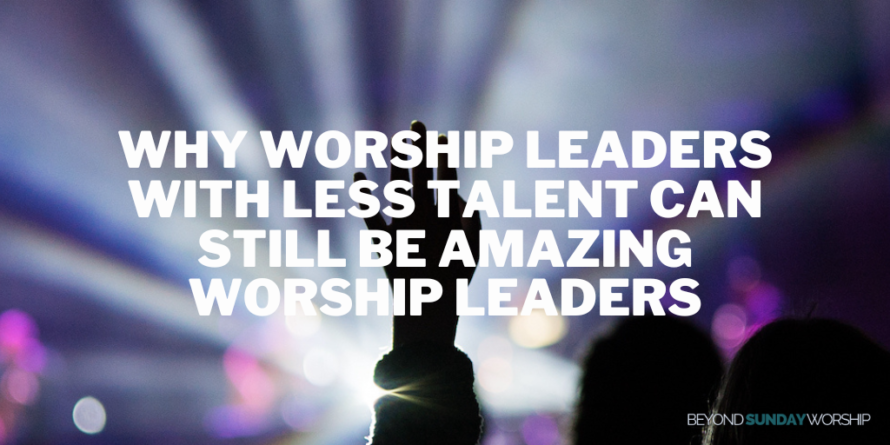
What I heard that particular day in 2008 would stick with me forever. It would ruminate in my head over and over and still does to this day.
I was just out of college. Excited for the future. Big dreams. I had decided early on in my college career that I was going to pursue worship ministry. I had wrestled with the idea of being pastor or being a worship leader. After much deliberation, I settled on worship.
I had a leader after I came out of college who said to me these words:
David, if you had a better voice. You would be unstoppable.”
Pain. Confusion. Dashed dreams. That hurt. And to be honest with you, it’s something that has stuck with me for a lot of years where. I’ve thought a lot about this. I get where this leader was coming from – they were validating my skills as a musician, as a leader, while also telling me that my voice just wasn’t very good. And so I’ve always wrestled with that sort of inadequacy, that insecurity.
Maybe if I did just have a better voice, then I would be a better worship leader.
God, why didn’t you give me a different voice?
That’s a very unproductive question. Because God makes no mistakes when he creates you, when he creates me. Maybe you are in a similar position. You feel your insecurities, your inadequacies. But what if you could use those to your advantage?
Maybe you had a parent, teacher, or a leader in some way that made you see and feel those insecurities front and center.
- Weak voice?
- Not much talent?
- Unskilled musician?
- Introverted?
- Too young?
- Too old?
Guess what? It doesn’t matter as much as you think. In a worship context you can actually use your weaknesses to an advantage with a shift in your thinking.
Is Talent a Problem?
I hope you’re not taking me as someone who thinks talented people are divas and inauthentic. Or that talent is somehow a weakness. I know many hundreds of incredibly talented worship leaders. When I hear them sing, they light up a room. But also they’re humble, authentic, love Jesus, and they pursue Him.
But I do know that there are thousands upon thousands of worship leaders that are being held back because of what someone has spoken over you or something that you believe about yourself.
Remember this: Worship has less to do with what happens on stage and more about what is happening in the room. Your job as a worship leader is to help people sing.
It’s not so much about finding your voice as much as it is helping the bride of Christ find hers.
The Most Important Question
Here’s the most important question that you can ask in preparation for Sunday: Who’s in the room and how do we connect with them?
If all your energy is spent you your plans, your singing, your playing, and you, you, you – you’ve missed the point. You need to understand your people.
- Who are they?
- How old are they (generally)?
- What do they know about Jesus?
- How long have they been in church?
- What music do they love?
- What songs connect?
The more you know – and the more you take the time to listen – the better worship leader you will be.
Is Talent the Most Important Thing?
I serve churches with staffing with a great organization called Slingshot. There’s an interesting trend we’ve noticed as we help churches find worship leaders – most churches are looking for the top 5-10% of talent.
I get it. You want to hire top talent. And especially when it comes to worship ministry, you want to have a worship leader and a worship team that has the wow factor – gifted, talented, hard working. Talent attracts talent. I totally get that. The problem is that the Church of 500 and the Church of 5,000 are looking for the same person.
But the reality is that there are a whole host of worship leaders who are less talented and getting overlooked. But so many of these worship leaders know how to engage a room – and that is the most important skill.
Again, worship is less about what happens on stage and more about what happens in the room. My friend Bob Sorge says it like this: “I would rather see a forest fire in the congregation than a bonfire on stage.” There are many of churches who are lighting it up, figuratively and literally. The lights, the haze, the band. The amazing songs, the energy, the stage presence, the passion, the talent, the songwriting, the records. I’m not minimizing or downplaying any of it, but you can have all of those things and have a congregation that is dead and disconnected.
The Best in the Room
Just because you’re the worship pastor doesn’t mean that you have to be the best in the room. You’re actually more valuable when you can lead people who are better than you.
Lead others – empower them, lead them, invest in them. You actually bring more value to your church and to your organization when you are a developer and a disciple-maker than you are just being talented on stage.
Lead with sensitivity. Build trust with people. Sing as much as you need and then back off the mic. Get out of the way. Empower your congregation to be the loudest sound in the room.